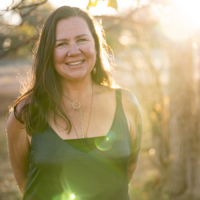View this post on Instagram
When I was 26 years old, my mom died unexpectedly in a motorcycle accident.
As I was feeding my son breakfast in his high chair, I heard her toot her horn goodbye as she roared off to work on her Harley Davidson.
Forty-five minutes later, I received a phone call to get to the local hospital immediately, as she had been in an accident. I yelled at my four-year-old son to get his shoes on and raced out the door. Cowboy boots were the only pair of shoes he could manage on his own. When we were escorted to a small side room at the emergency room, suddenly his pajamas and boot combination didn’t matter. My mom had passed away immediately after the accident.
My mom Gail had been a fit runner, bicyclist, and all around athlete. She was 46 years old. Her death was completely unexpected. While I white-knuckled finishing college, raising my son, and trying to maintain my sanity, I sank into the fog of grief. It was a full decade later that I would begin to find my way out of this profound sadness. My journey back started with yoga asana, then meditation, and finally a spiritual life in the form of Tibetan Buddhism.
What I wish I would have known when my mom died is the truth of our existence: life and death are intricately connected. To this end, Buddhism offers a wonderful practice that might have helped ease some of the pain I experienced after the sudden loss of my mom—a death meditation.
The traditional death contemplation has four parts:
1. Because we are born, we will die.
2. The hour of our death is completely uncertain.
3. Many things can kill us, even things we might consider good for us! Nothing can ultimately keep us alive.
4. As we must all die alone, the thing that will help us in the end is the accumulation of the good we have done. Have we lived our life to the fullest?
When we come into the world, our arrival is marked with our first breath. It is our final exhale that marks the end of this lifetime. How we live our life between these two breaths is important for how we die. To die feeling content with the life that we have lived, we need to generate goodness.
Understanding and spending time each day contemplating that we will die and we don’t know when inspires wholehearted living that rises above pettiness, judgment, and arguing. It helps us make better decisions around where we invest our time and resources. It helps us to let go of grudges and to take the higher road.
For me personally, it has helped me to put down the remote control, to turn off the news, walk away from friends who are petty, and to pick up a lot of time in nature and a daily meditation practice coupled with a spiritual life. I am a much happier and content person as a result.
Want to live a happier and more fulfilling life? Upon waking up each morning, say to yourself, “I’m alive. Today might be my last day in this lifetime. It is uncertain when I’ll die. Because of this, I’m committed to living a full wholehearted life and letting the little things go. I’m going to be a helper and not a hurter today. I’m going to live my life to the fullest.”
When invoked regularly, this practice can get us through the hardest of times. It also amplifies the best of times, as they seem even more precious. It prepares us to expect the unexpected.
Had I experienced this practice before my mom “unexpectedly” passed away, it might have saved me an entire decade of grief and living in the past instead of appreciating the present moment to the fullest extent.
~
Please consider Boosting our authors’ articles in their first week to help them win Elephant’s Ecosystem so they can get paid and write more.


Read 20 comments and reply